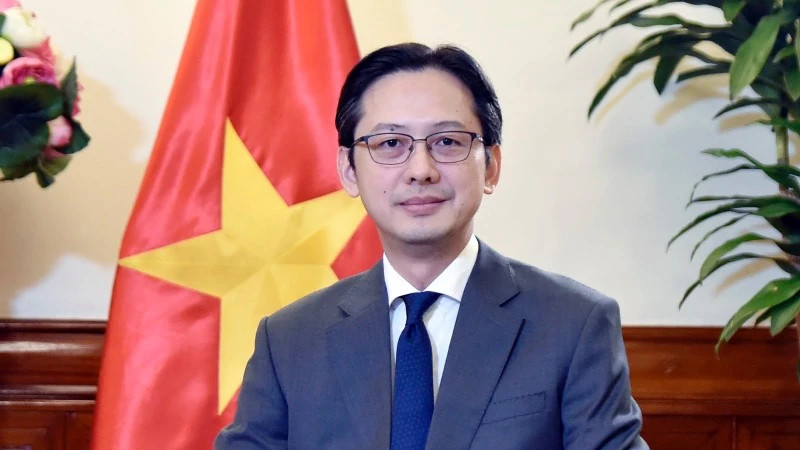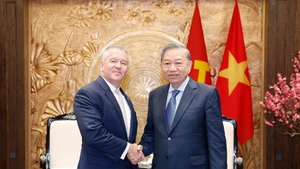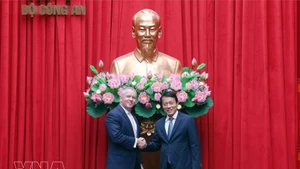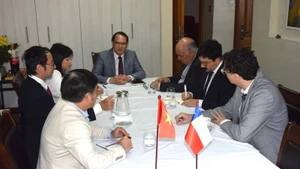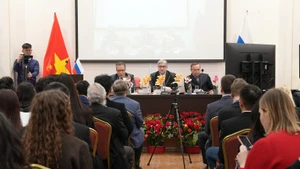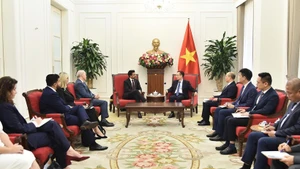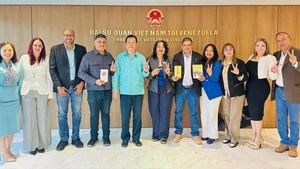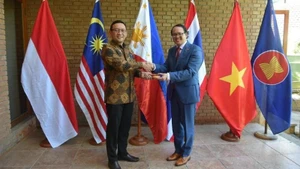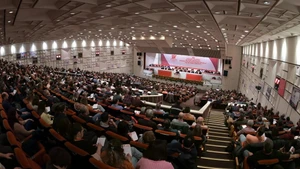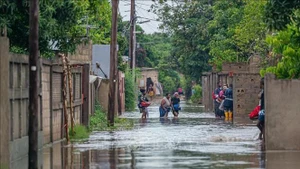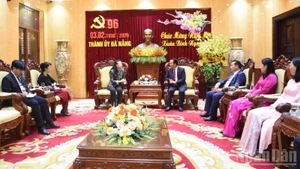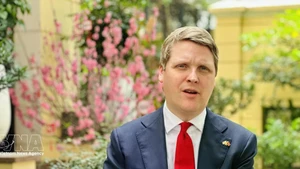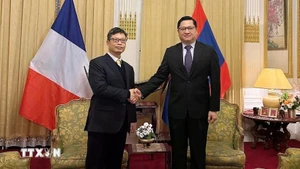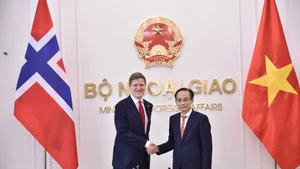Reporter: Could you please share the purpose and significance of Prime Minister Pham Minh Chinh’s official visit to Malaysia?
Deputy Minister Do Hung Viet: The prime minister’s official visit to Malaysia is part of efforts to implement the foreign policy set out at the 13th National Congress of the Communist Party of Viet Nam, which places importance on and gives priority to strengthening ties with neighbouring countries and ASEAN members, including Malaysia — a comprehensive strategic partner and one of Viet Nam’s key economic partners.
The visit also takes place as Viet Nam celebrates 30 years of ASEAN membership, marking the beginning of its regional and international integration journey. It reflects Viet Nam’s strong support for Malaysia’s ASEAN Chairmanship in 2025 and its commitment to working with Malaysia and other member states to build a “resilient and inclusive” ASEAN Community that is unified, strong, and central to regional peace and stability.
This visit is expected to further deepen the comprehensive strategic partnership between the two countries. Leaders on both sides will outline concrete orientations and measures to inject new momentum into bilateral cooperation and connectivity, enhancing its scope and effectiveness in line with the level of the relationship.
Reporter: How would you assess current Viet Nam–Malaysia relations, and what are the expectations for this visit?
Deputy Minister Do Hung Viet: Perhaps the clearest indication of the strength and promise of Viet Nam–Malaysia relations is the decision to elevate bilateral ties to a comprehensive strategic partnership in November 2024.
High-level leaders of both countries have maintained frequent exchanges, notably the official visit to Malaysia by Party General Secretary To Lam in 2024 and the visit to Viet Nam by Malaysian Prime Minister Anwar Ibrahim during the 2nd ASEAN Future Forum in February 2025. More recently, the two prime ministers held two phone conversations within a month to share assessments of global and regional developments and discuss measures to strengthen bilateral and ASEAN cooperation.
Economic cooperation is a key pillar and has been growing positively. Malaysia is currently Viet Nam’s third-largest trading partner in ASEAN and ninth globally, and also the third-largest ASEAN investor in Viet Nam.
The two countries share similar development aspirations. Notably, both countries embrace a people-centred development philosophy. Viet Nam identifies its people as the centre, the goal, the driving force and the resource for sustainable national development. Meanwhile, Malaysia has set the goal to become one of the top 25 countries in the world in terms of human development index within the next decade. This is a vivid illustration of the deep closeness between the two nations, not only geographically, but also philosophically and in terms of long-term development priorities.
I am confident that Prime Minister Pham Minh Chinh’s upcoming visit will further reinforce political trust, address existing challenges, and define concrete directions and measures to advance the Viet Nam–Malaysia Comprehensive Strategic Partnership in the time ahead, for the benefit of both peoples and for peace, stability, and development in the region.
Reporter: Could you elaborate on the significance and objectives of the 46th ASEAN Summit and related meetings?
Deputy Minister Do Hung Viet: First of all, 2025 marks a full decade since the formal establishment of the ASEAN Community. These meetings offer an opportunity for ASEAN countries to reflect on the journey they have taken, to overcome numerous challenges to advance peace, security, prosperity and development, and to become a cohesive, dynamic and aspirational community.
Secondly, at a time when the world and the region are experiencing profound upheaval, the theme “Resilient and Inclusive” will guide ASEAN’s cooperation in 2025, with a focus on promoting economic integration, trade, investment, and tapping into new growth drivers.
Thirdly, the summit will adopt a new framework for cooperation over the next 20 years. The ASEAN Community Vision 2045, along with four strategic pillars — political-security, economic, socio-cultural, and connectivity — will build on existing achievements and enhance ASEAN’s capacity and resilience in facing future challenges. ASEAN must not only adapt but also lead. It must not only act but also create. That is the core spirit of ASEAN’s forward-looking documents.
Reporter: What messages, orientations and contributions will Viet Nam bring to this ASEAN Summit? Are there specific documents expected to be adopted?
Deputy Minister Do Hung Viet: As I mentioned earlier, 2025 holds special significance for ASEAN. For Viet Nam, this significance is further magnified as it marks the 30th anniversary of our ASEAN membership.
Over the past three decades, Viet Nam has grown in maturity, confidence and proactivity in both ASEAN and the broader international integration process. These thirty years also reaffirm ASEAN as a pillar of Viet Nam’s foreign policy. As Party General Secretary To Lam highlighted in his keynote address at the ASEAN Secretariat in January this year: “At this historic new starting point, Viet Nam and ASEAN are united in pursuing ambitious goals.”
With that spirit, the high-level Vietnamese delegation led by Prime Minister Pham Minh Chinh will attend the ASEAN Summit with a consistent message of proactivity, responsibility and readiness to make greater contributions to ASEAN’s shared endeavours. Viet Nam hopes to work with fellow member states to shape strategic directions and concrete actions to strengthen the foundations of regional cooperation and elevate ASEAN’s global stature in the coming period.
In recent times, Viet Nam has actively cooperated with other ASEAN members in drafting several strategic documents. Of particular importance is the ASEAN 2045 package titled “Our Shared Future”, which is expected to be adopted at this summit. From the outset, Viet Nam’s ministries and sectors have been actively involved in contributing content, ensuring core principles such as internal unity and ASEAN centrality, while also putting forward practical, innovative ideas to create breakthroughs cooperation across the three pillars and intersectoral areas.
This leadership role has been clearly demonstrated through Viet Nam’s organisation of the ASEAN Future Forum in both 2024 and 2025, providing a space for open dialogue on issues vital to ASEAN’s future and contributing substantively to shaping its cooperation towards 2045.
With the theme “Resilient and Inclusive”, these summits are expected to open new directions that will further advance community building and energise ASEAN’s relations with external partners. On that basis, Viet Nam will work with fellow member states to discuss and agree on key cooperation priorities across three main areas:
First, reaffirming the value and vitality of multilateralism, promoting dialogue, building trust, and upholding international law, while also enhancing ASEAN’s central role amid complex geopolitical shifts.
Second, launching a new roadmap for building the ASEAN Community, aiming to realise the vision of a resilient, innovative, dynamic, and people-centred ASEAN.
Third, fostering both intra- and extra-regional connectivity, with a focus on expanding trade and investment cooperation, leveraging existing agreements, and promoting a fair, transparent and rules-based multilateral trading system.
I firmly believe that with the companionship of member states and support from partners, these summits will not only build on past achievements but also mark a new step forward, making concrete contributions to peace, stability, and sustainable development.
